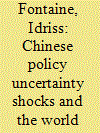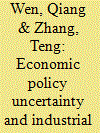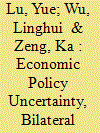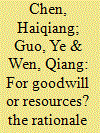|
|
|
Sort Order |
|
|
|
Items / Page
|
|
|
|
|
|
|
| Srl | Item |
| 1 |
ID:
161868


|
|
|
|
|
| Summary/Abstract |
How far could a rise in uncertainty affecting China be transmitted to other economies? This paper investigates the possible spillovers from a shock to Chinese Economic Policy Uncertainty (EPU) to developed (the United States, the Euro Area, Japan and South Korea) and emerging economies (Brazil and Russia). To take into account the non-linear nature of uncertainty shocks, we estimate a Smooth-Transition Vector Auto-Regressive (STVAR) model differentiating phases of expansion and phases of recession. We find important asymmetries in the responses to Chinese uncertainty shocks of macro-variables especially for the United States (US), the Euro Area (EA) and South Korea. Indeed, these countries display almost no response to the identified shock during booms. However, when hit in downturns, they suffer from a fall in industrial production, inflation and exports together with an increase in unemployment (except for Korea). Emerging countries (Brazil and Russia) stand out in the extent to which they significantly respond to the Chinese shock in both identified regimes. Lastly, the Japanese economy seems to be less sensitive to the Chinese shock.
|
|
|
|
|
|
|
|
|
|
|
|
|
|
|
|
| 2 |
ID:
187821


|
|
|
|
|
| Summary/Abstract |
This paper explores the effect of economic policy uncertainty (EPU) on industrial pollution using China's real-time pollution data and a novel news-based EPU index constructed by Davis, Liu, and Sheng (2019). Empirical results suggest that EPU can significantly promote sulfur dioxide (SO2) readings in cities experiencing higher ex-ante fiscal pressure, and this effect is more profound during the daytime. Given that SO2 is the main contributor to industrial pollution, and local governments have less incentive to monitor illegal pollutant discharges during the nighttime period, our findings indicate that rising EPU will harm the environment by motivating local authorities to reduce environmental supervision and thus increase industrial pollution. We also find that promoting regional innovation and strengthening external environmental regulations can mitigate the pollution effect of economic policy uncertainty.
|
|
|
|
|
|
|
|
|
|
|
|
|
|
|
|
| 3 |
ID:
179935


|
|
|
|
|
| Summary/Abstract |
This paper examines the effect of bilateral investment treaties (BITs) in promoting outward Chinese foreign direct investment (COFDI) in the presence of rising economic policy uncertainty in China’s partner countries. We postulate that the signing of BITs should help stimulate COFDI because the treaties send a credible signal to foreign investors about the host country’s intent to protect Chinese investment, and make it more difficult for the host country to violate its treaty obligations. BITs that contain rigorous investment protection and liberalization provisions, in particular, should be more likely to encourage COFDI as they directly influence Chinese investors’ expectations about the stability, predictability, and security of the host market. However, while BITs generally promote COFDI, host country economic policy uncertainty may also limit their effectiveness. This is because uncertainty tends to undermine investor confidence, trigger capital flows from high- to low-risk countries, and dampen commercial activities. Poisson pseudo-maximum likelihood (PPML) estimation models of the determinants of COFDI to 188 countries between 2003 and 2017 lend substantial support to our conjectures.
|
|
|
|
|
|
|
|
|
|
|
|
|
|
|
|
| 4 |
ID:
168356


|
|
|
|
|
| Summary/Abstract |
This paper studies how economic policy uncertainty affects corporate tax burden. We show that economic policy uncertainty is positively related to corporate tax burden, and the effect is stronger when the tax quotas are higher. Furthermore, we find that economic policy uncertainty strengthens tax collection by increasing government fiscal pressure, thereby increasing corporate tax burden. Besides, the effects of economic policy uncertainty on corporate tax burden are primarily significant in state-owned enterprises (SOEs), non-high-tech firms, firms from the eastern areas and service industry firms. The evidence illustrates that keeping the transparency and stability of economic policies helps to cut tax burden effectively.
|
|
|
|
|
|
|
|
|
|
|
|
|
|
|
|
| 5 |
ID:
182724


|
|
|
|
|
| Summary/Abstract |
This paper investigates the impact of economic policy uncertainty (EPU) on the corporate philanthropy (CP) behaviors of firms using a dataset from Chinese A-share listed firms. We find that, on average, firms decrease their CP significantly when economic policy uncertainty increases, but the response is heterogeneous for firms with different ownership types. Compared with their counterparts, private firms are willing to contribute more donations in an environment with high economic policy uncertainty. Further analysis shows that private firms take on more other types of corporate social responsibility at the same time, and private firms' additional CP in a high EPU environment is rewarded with more subsidies, indicating that altruistic and political motives may play important roles in driving the CP behaviors of private firms. There is no evidence that private firms selling products directly to consumers are more likely to engage in additional CP. Our findings indicate that the main motivation behind Chinese private firms' additional CP under high economic policy uncertainty is seeking more government resources, instead of keeping consumers loyal by maintaining good reputations during hard periods.
|
|
|
|
|
|
|
|
|
|
|
|
|
|
|
|
|
|
|
|
|